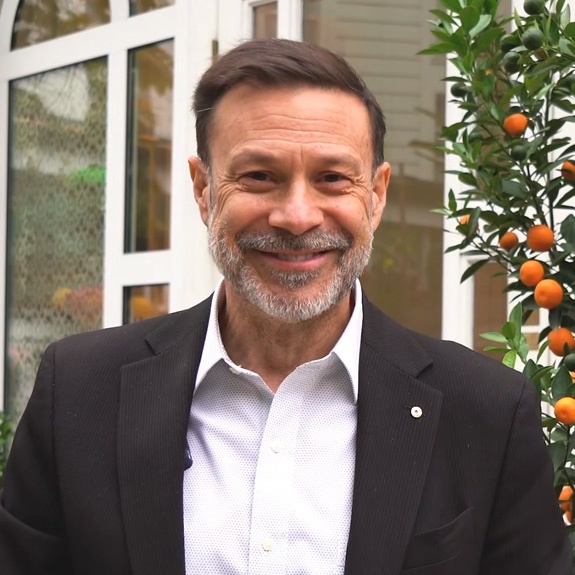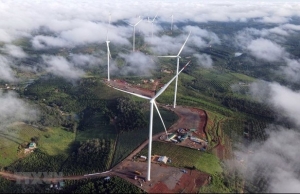The path to faster growth in Australia-Vietnam relations
I have arrived here at a fortunate time. Vietnam, like Australia, has emerged from the COVID-19 pandemic with both its reputation and its economy intact. The pandemic was, in fact, an opportunity to increase cooperation between Australia and Vietnam, with the embassy donating more than 26 million vaccine doses, 2,000 refrigeration units, and many other medical supplies.
 |
| Andrew Goledzinowski, Australian Ambassador to Vietnam |
It is also a fortunate time in terms of our bilateral relations, and the friendship between Vietnam and Australia has never been stronger than it is today.
Our status as natural partners was confirmed recently by the official visit to Australia by the National Assembly Chairman Vuong Dinh Hue. I accompanied him to Australia, where he was received at the highest levels of government and state. The most significant outcome, in a formal sense, was the joint announcement by Chairman Hue and Prime Minister Albanese of the intention to upgrade our bilateral relations to the highest level.
But, informally, I thought the most important aspect of the visit was the mutual and sincere warmth I witnessed from all quarters – particularly in Hue’s visits to a number of Melbourne universities, including Swinburne where Chairman Hue himself studied.
While the Vietnam/Australia relationship is no doubt in excellent shape, there is always room for improvement. Chairman Hue identified that, while bilateral trade is growing rapidly (up more than 30 per cent over the past year), our two-way investment is underdone.
Vietnam is a rapidly developing country, while Australia is a large economy in the same region. We started 2021 as the world’s 14th biggest economy and figures show that we finished 2022 in 12th place. And yet the total stock of two-way investment is less than AU$3 billion ($2.07 billion).
This is a modest figure, particularly given that Australia was once a pioneering investor in Vietnam, including the first international bank, ANZ; the first foreign law firm in Philips Fox, which became Allens; the first western telecom provider, now known as Telstra; and the first foreign university in RMIT.
I have identified seven reasons why Australian investment may not have grown as fast as it might have but, also, why this is turning around - either through government action or through the natural economic and social convergence of our two nations.
Value curve
Until recently, Vietnam’s greatest success has been in large scale, labour-intensive, manufacturing. This is not where Australia excels.
But as Vietnam’s economy modernises and digitalises, it will also move up the value curve. This is where Australian expertise and Vietnamese ambition will meet. Australian firms will increasingly become partners of choice for everything from agri-tech through to IT, to high-end financial services and much more besides. Some of these companies are small, but cutting-edge.
Clean energy transition
Both our countries have made commitments to achieving net-zero emissions. Australia is moving from being a major supplier of fossil fuels to becoming an exporter of renewable energy such as including green hydrogen. Our Prime Minister promises we will become a green energy superpower.
At the same time, we are investing in Vietnamese wind farms and, through our partnership with VinFast and the World Bank, in the rollout of electric vehicle charging stations and electric buses.
Regulatory environment
Australian public companies and institutional investors are traditionally cautious about entering markets perceived as risky. Vietnam is addressing these perceptions, including by looking at how bureaucratic decision-making can be simplified, sped up and made more transparent – and how indicators on ease of doing business in Vietnam can be lifted.
Also, the state’s campaign against official corruption is being stepped up. These points were particularly highlighted at the fifth Vietnam Economic Forum in December, in which the Australian Embassy was involved.
Low mining activity
The absence of a modern international mining sector in Vietnam has naturally limited Australian investment. Australian mining companies are some of the largest and most experienced in the world. But more than that, the absence of large Australian miners has had another effect – because they are often the first to enter a market, their absence here has sent a misleading signal to other prospective entrepreneurs.
Vietnam is, in fact, a good place to do business, as many Australian companies are finding. But reforms that enable the entry of high-quality international miners are urgently needed – both for the value it will bring and the signal it will send.
Better options elsewhere
Before the pandemic, Australia enjoyed three decades of uninterrupted economic growth – a world record. This meant that cautious investors could leave their money in Australia and still make a reasonable return. This includes the AU$3.3 trillion ($2.28 trillion) under management in Australian pension funds. Other investors chose China as a safe and familiar place to do business. Today, the emerging picture looks somewhat different.
Corporates, traders, and institutional investors have recognised the value of diversification, including in supply chains. ‘Just-in-case’ is replacing ‘just-in-time’ as a strategic goal. Vietnam is in an excellent position to benefit from this global rebalancing. But it remains a highly competitive environment – particularly for new high-tech investments.
Vietnamese Australians
Around 350,000 Australians identify as Vietnamese. They comprise one of our most vibrant and energetic communities. In Melbourne, Vietnamese is the second most widely spoken language. In previous decades, language was a barrier to doing business in Vietnam; but today it is a bridge.
It is also a natural advantage for Australia. In my four months in Vietnam, I would say that at least half of the Australian business people I have met have a Vietnamese background. This is not something governments need to encourage; it is happening naturally, and this important connection will continue to grow to the benefit of both countries.
Education and training
Education and training levels have been a key determinant of the quality and scale of foreign investment in Vietnam, and sometimes a limiting factor. Digitalisation and automation will make further demands of the Vietnamese workforce. Again, Australia is well positioned to assist. In pre-pandemic times, more than 30,000 young Vietnamese were studying in Australia. In the future, we expect this number to grow substanially.
With all that being said, I expect that two-way investment will soon become an even more important part of the Vietnam-Australia story, to the great benefit of both our nations.
 | Vietnam and Australia promoting bilateral trade and investment As Business Champions Vietnam-Australia 2022 celebrates its first anniversary, it promises to continue facilitating trade and investment. |
 | Australia promotes carbon market collaborations The Australian Department of Foreign Affairs and Trade's (DFAT) Business Partnerships Platform (BPP) announced six new private sector partnerships on November 29. |
 | Japan, US, Australia to assist Vietnam in decarbonisation Government-backed financial institutions from Japan, the US, and Australia have pledged to support Vietnam's efforts to cut carbon emissions, according to the chairman of the Japan Bank for International Cooperation (JBIC). |
What the stars mean:
★ Poor ★ ★ Promising ★★★ Good ★★★★ Very good ★★★★★ Exceptional
Related Contents
Latest News
More News
- Hermes joins Long Thanh cargo terminal development (February 04, 2026 | 15:59)
- SCG enhances production and distribution in Vietnam (February 04, 2026 | 08:00)
- UNIVACCO strengthens Asia expansion with Vietnam facility (February 03, 2026 | 08:00)
- Cai Mep Ha Port project wins approval with $1.95bn investment (February 02, 2026 | 16:17)
- Repositioning Vietnam in Asia’s manufacturing race (February 02, 2026 | 16:00)
- Manufacturing growth remains solid in early 2026 (February 02, 2026 | 15:28)
- Navigating venture capital trends across the continent (February 02, 2026 | 14:00)
- Motivations to achieve high growth (February 02, 2026 | 11:00)
- Capacity and regulations among British areas of expertise in IFCs (February 02, 2026 | 09:09)
- Transition underway in German investment across Vietnam (February 02, 2026 | 08:00)

 Tag:
Tag:




















 Mobile Version
Mobile Version